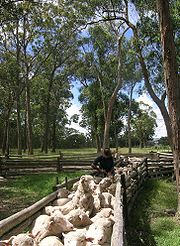
Deworming
Encyclopedia

Anthelmintic
Anthelmintics or antihelminthics are drugs that expel parasitic worms from the body, by either stunning or killing them. They may also be called vermifuges or vermicides .-Pharmaceutical classes:...
drug (a wormer, dewormer, or drench) to an animal to rid it of intestinal parasites, such as roundworm and tapeworm. Purge dewormers for use in livestock
Livestock
Livestock refers to one or more domesticated animals raised in an agricultural setting to produce commodities such as food, fiber and labor. The term "livestock" as used in this article does not include poultry or farmed fish; however the inclusion of these, especially poultry, within the meaning...
are often formulated as a liquid that is squirted into the back of the animal's mouth, as an injectable, or as a pour-on which can be applied to the animal's topline. In horses, purge dewormers are most commonly formulated in an oral paste or gel form, but a liquid drench form is often used by veterinarians. Daily or continuous wormers are also commonly used in horses. In dogs and cats, purge dewormers come in many forms including a granular form to be added to food, pill form, chew tablets, and liquid suspensions.
Sheep
Deworming (drenching) a sheep is usually done with a specific drenching gun that squirts an anthelminticAnthelmintic
Anthelmintics or antihelminthics are drugs that expel parasitic worms from the body, by either stunning or killing them. They may also be called vermifuges or vermicides .-Pharmaceutical classes:...
into the sheep's throat.
In humans
According to the World Health OrganizationWorld Health Organization
The World Health Organization is a specialized agency of the United Nations that acts as a coordinating authority on international public health. Established on 7 April 1948, with headquarters in Geneva, Switzerland, the agency inherited the mandate and resources of its predecessor, the Health...
, nearly 2 billion people worldwide are infected with soil-transmitted helminthes (intestinal worms) or water-borne trematode worms called schistosomes. Many of those affected by worms live in low-income countries and do not have access to clean water and functional sanitation systems. Worm infections, while not immediately life-threatening, can have a significant negative impact on a child’s cognitive ability and general health. For example, children who have worms are more likely to become seriously ill and less likely to attend school on a regular basis. Worms also present a barrier to increased economic development since children who have worms are less likely to be productive as adults.
A number of prominent health organizations and experts have promoted the deworming of children in the developing world as a potentially effective public health and development strategy. In low and middle-income countries where deworming policies have been adopted, it has generally proven to be a highly effective and economically efficient public health intervention. Because of its proven effectiveness and the relatively low cost of intervention, deworming has attracted the attention of public health officials, development experts, and others concerned with global health. Research completed by Michael Kremer and Edward Miguel,http://poverty-action.org/sites/default/files/miguel_worms.pdf studied the effect of school-based deworming on educational outcomes, finding that deworming leads to increased school attendance in participating schools and produces community-wide benefits as well.
See also
- AnthelminticAnthelminticAnthelmintics or antihelminthics are drugs that expel parasitic worms from the body, by either stunning or killing them. They may also be called vermifuges or vermicides .-Pharmaceutical classes:...
- Horse careHorse careThere are many aspects to horse care. Horses, ponies, mules, donkeys and other domesticated equids require attention from humans for optimal health and long life.-Living environment:...
- ParasitismParasitismParasitism is a type of symbiotic relationship between organisms of different species where one organism, the parasite, benefits at the expense of the other, the host. Traditionally parasite referred to organisms with lifestages that needed more than one host . These are now called macroparasites...
- LevamisoleLevamisoleLevamisole is an anthelminthic and immunomodulator belonging to a class of synthetic imidazothiazole derivatives. It was discovered at Janssen Pharmaceutica in 1966...
, intended for veterinary use as a dewormer for cattle, pigs, and sheep

